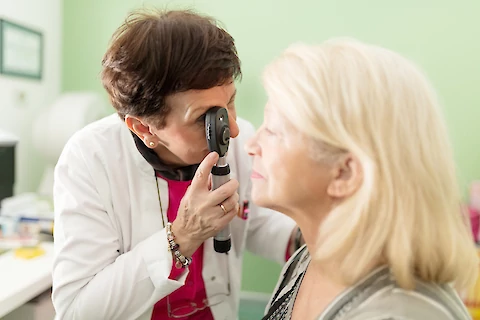
The American Academy of Ophthalmology recommends a complete eye exam at least every two years after age 65. That way, the ophthalmologist can catch any problems early while they may still be treatable. As a senior gets older, it's recommended that they have their eyes examined a minimum of once a year.
If your elderly loved one is in their 70s or 80s, they should have a comprehensive eye exam more often. Their San Mateo area ophthalmologist will recommend a schedule based on your senior's individual needs. For instance, a senior may need an exam more often if they have existing eye issues, a family history of eye problems, or are living with diabetes or high blood pressure.
What Happens During a Comprehensive Eye Exam?
During a complete eye exam, an ophthalmologist will look for the following signs of eye disease:
- age-related macular degeneration
- diabetic retinopathy
- cataracts
- glaucoma
Unsuspected strokes and undiagnosed diabetes can also be identified during a thorough eye exam.
An ophthalmologist will generally recommend dilation since it allows them to get a really good look at the back of the eyes. This is especially important since that area is where many eye problems in seniors first develop.
What Questions Should a Senior Ask?
A senior should report any sudden changes to their vision or unusual pain, redness, or discharge because they may need an urgent examination and treatment. They should also discuss their medications with their eye doctor since those medications may be causing dry eyes or blurred vision.
If a senior is seeing a new eye doctor, they should inform the doctor of any pre-existing eye issues, a family history of eye problems, or their own medical issues such as high blood pressure or diabetes. They should also mention hobbies or other activities that may be causing eye strain.
Milwaukee Eye Surgeons suggests asking these questions during the exam:
- What tests are you performing?
- Can you explain my test results so that I can understand them?
- Is my eye problem treatable?
- What can I do to help preserve my vision?
- Will my vision get any worse?
- What symptoms should I be aware of?
- When should I schedule my next visit?
VisionAware recommends that seniors take a trusted companion with them to the eye exam to remind them of anything they need to tell the doctor or questions they want to ask. That companion can also jot down answers to those questions or any information the doctor provides.
Your Eyes and Diabetes
According to WebMD, a person with diabetes may develop cataracts and glaucoma at an earlier age than someone without diabetes. Depending upon how well a senior with diabetes controls their blood sugar, they may notice symptoms such as blurry vision, distorted vision (caused by diabetic retinopathy), or gradually worsening vision. They should schedule a complete eye exam immediately if they notice any of these symptoms.
How Senior Helpers Can Help with Eye Care
At Senior Helpers San Mateo, we can help your elderly loved one schedule eye appointments, provide transportation, remind them to take their medications on time, and much more.
If your beloved senior lives in San Mateo, Redwood City, Burlingame, or Millbrae, CA, contact us to learn more about how we can help make life easier.